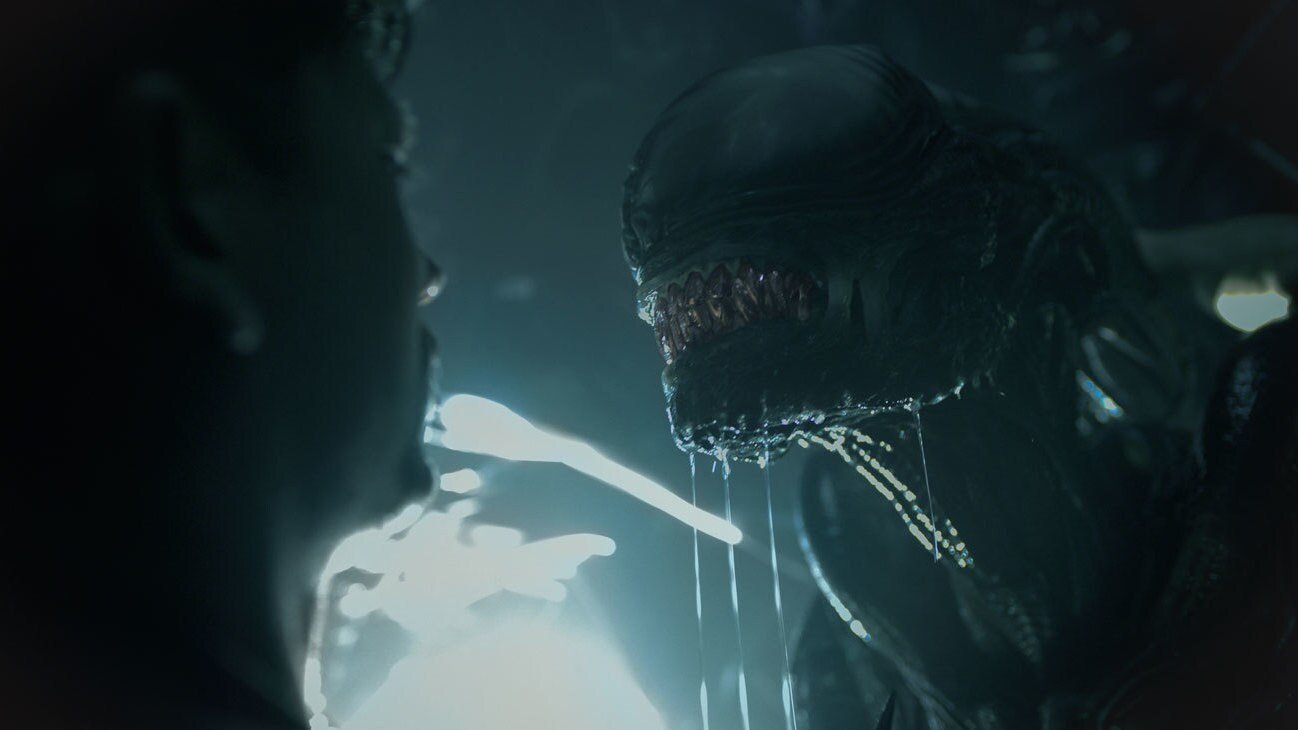
Alien: Romulus
Review
A new breed of horror.
Spoilers Ahead
Silent Anticipation
I approached Alien Romulus with a mixture of excitement and apprehension. The series has had its fair share of ups and downs, and each new entry holds the promise of either revitalizing the saga or falling short of its storied legacy. As the lights of the cinema went down and the room went silent as the film began… it remained silent.
In a cinematic landscape saturated with explosive soundtracks and relentless action, Alien Romulus dares to embrace the power of silence more than most horror films. One of the most striking features of Alien: Romulus is its deliberate and artful use of silence. From its very first frames, the film immerses viewers in the cold, indifferent void of outer space. This storytelling device kept me in suspense throughout the film, not only through the exterior shots of the drifting space station, but also in low-to-no noise scenes with our main characters trying to survive their encounter with the franchise’s titular Alien; the Xenomorph. The absence of sound in these moments magnifies the suspense, drawing viewers into a state of heightened anticipation.
This technique is not new to the Alien franchise but in Romulus, it reaches new heights. The silence is not merely an absence of noise, but a deliberate tool that shapes the narrative and influences the viewer's emotional response. Each quiet moment is charged with possibility, hinting at the horrors that lurk just beyond the frame. The silence becomes a character in its own right, a malevolent force that heightens the tension and underscores the isolation of the film's protagonists.

The anticipation in "Alien Romulus" is not just a product of the film's immediate context but a culmination of decades of viewer conditioning. Fans of the franchise have come to expect certain tropes—sudden scares, shocking twists, and the ever-present threat of the xenomorph. This conditioning plays a crucial role in the effectiveness of the film's suspense.
Alien: Romulus director Fede Álvarez skillfully exploits this anticipation, using it to manipulate the audience's expectations and deliver a fresh experience. The silence in the film's pivotal scenes allows for a slow build-up of tension, creating a sense of unease that is both familiar and new. When the expected scares do arrive, they are all the more impactful because they emerge from the stillness. The film's ability to keep viewers guessing, even as it adheres to familiar patterns, is a testament to its clever narrative design.
Familiar Aliens,
New Prey
A new entry in the franchise calls for a new set of characters and Cailee Spaeny as Rain is the standout performance, evoking many parallels with Sigourney Weaver’s portrayal as Ripley.
Spaeny delivers a captivating and powerful performance as Rain in Alien: Romulus. Her portrayal is both nuanced and compelling, bringing a fresh and intense energy to the beloved franchise. Spaeny's ability to convey a wide range of emotions, from vulnerability to fierce determination make her character worthy of standing on the shoulders of Ripley. She seamlessly blends strength and sensitivity, creating a multi-dimensional heroine who drives the narrative forward with grace and grit.
The supporting cast of Alien: Romulus delivers stellar performances that enrich the film's tension and emotional depth. Aside from some forgettable, cast-aside characters that serve as little more than Xenomorph food, there are some notable performances.
David Jonsson stars as Andy, a malfunctioning android reprogrammed by Rain Carradine's father to serve as her caretaker and companion, effectively becoming her adopted brother. Jonsson delivers a standout performance, skillfully blending the character's synthetic nature with a heartfelt sense of humanity, making him a compelling and memorable presence in the film.
Next to Spaeny, the standout performance is from Isabela Merced who plays Kay Harrison - a pregnant young women accompanying the crew to the Renaissance space station. The narrative begins with her as a protective figure, determined to ensure her survival and that of her unborn child despite the lurking dangers. As the crew faces relentless attacks from Xenomorphs, Kay's arc takes a dark turn when she is captured by one of the creatures, and Merced’s performance truly creates a sense of dread and terror as the final act of the film begins.
Interstellar Effects
Director Fede Álvarez's strategic use of CGI, combined with practical effects, creates a seamless and immersive atmosphere that pays homage to the original films while introducing innovative visual elements. Unsurprisingly, the veteran teams at ILM and Weta FX were at play here, masterfully blending the footage of practical models with their unmatched prowess of CGI to keep things feeling “real” and believable. All that said, the use of CGI was not the only way the film was produced to feel nostalgic.
In Alien: Romulus, the filmmakers intentionally employed a grainy visual style to evoke the aesthetic of the original Alien film. Director Fede Álvarez aimed for the new film's visuals to seamlessly blend with those of the 1979 classic (and David Cameron’s Aliens). To achieve this, the production team analyzed stills from both films to match colors and textures closely and developed a custom film grain to replicate the original's look more accurately, which I believe worked flawlessly.
Alien Romulus emerges is a terrifying addition to the sci-fi genre, seamlessly blending heart-pounding action with breathtaking visual effects. The standout performances by Cailee Spaeny, David Jonsson and Isabela Merced, under the masterful direction of Fede Álvarez bring depth and authenticity to the film worthy to the troubled legacy of the franchise. This film leaves me wanting more from the Alien series and I hope to see Spaeny’s journey to continue.




